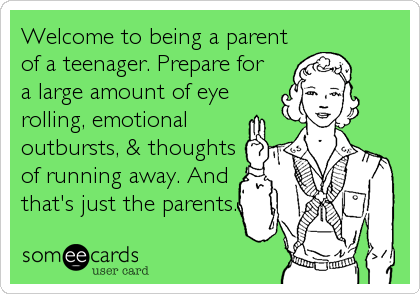“I don’t understand my kids.” That is an easy sentiment since the youth culture reinvents itself every few months. What jeans should I wear—loose or tight, what music is good, what word should I use to say something is cool? I can’t keep up. In this post we try and explain the art of understanding your teenager.
There’s so much to keep up with! But that doesn’t mean you don’t understand your teenager. You may not understand the teenage culture, but you do understand your teenager. The fashion, the slang, the music, the what’s hot/what’s not lists, and even morals have greatly changed, but how your teenager rides the cultural roller coaster is not different than how you rode your own version of that roller coaster. As much as things have changed, they’ve also stayed the same.

How can you understand your teenager? Live in the past—sort of. Pull out your yearbook, put on some Milli Vanilli, get the big hair thing going again (or the mullet) and remember what it was like:

#1 Growing into your body.
Remember changing shoe sizes three times in six months and learning how to walk with these new Buick-sized feet? I remember reading out loud in seventh grade English, only to have my changing voice crack and jump up two octaves.
#2 Riding the waves of emotions.
Those same hormones that were pushing your body into overdrive were also doing a number on your emotions. Remember feeling all squishy inside just because some girl looked at you? Surely you remember the monumental mood swings: giddy one minute and sullen and withdrawn the next. Somedays you didn’t know what to feel.
#3 Feeling inferior.
All those physiological changes affected how you felt about yourself. If you were a late-bloomer (like me), you wondered if you were ever going to catch up to the other guys. We became very self-conscious during adolescence. We typically compared ourselves to others and usually came up short. Didn’t matter if you were a straight A+ student; you felt inferior because you were a lousy athlete who missed the floor when dribbling a basketball.
#4 Trying to fit in.
Part of your self-consciousness was trying to figure out who you were. As children, we got our identity from mom and dad. When we became teenagers we tried to find our identity from the team, the band, the in-crowd, the chess team (well, maybe not). You wanted to find your identity with a certain group you thought was so you followed their lead. That explains some of the bad fashion statements you may have made. It also explains some risky behavior.
Are your memories coming back? These are the same issues your teenager is facing. Today is certainly a different setting than 1989, but replace The Cosby Show with Modern Family, and you’ll find the same teen issues.
So how do you communicate with your teenager?
I would be very careful about starting the conversation with “When I was your age…” Even the early 2000’s is ancient history to teenagers today, so they’re going to think you really don’t understand what they’re going through.
Too often, when we try to connect our kids with the ancient history of our high school days, we do one of two things. Sometimes we hijack their feelings. “You think that’s bad. Let me tell you about my experience in the cafeteria!”
We can often go to the other extreme, though, simply because we do understand.
“I remember what it was like trying to fit in. It’s not as bad as you think. It’ll be OK.” That is probably true, but the irony is that, even though we do understand, that kind of statement leads our children to think just the opposite. To them it is a big issue, but we are perceived as downplaying their feelings.
There will be times when you can reminisce in public, but I found the best thing I can do is listen. I listen, sympathize, don’t overreact. I find that, by remembering my own teen years, I am more understanding and less judgmental. (“What were you thinking???). I did not have to regale my sons with stories of my own exploits, trials, and tribulations, but I could be a lot more understanding. Biblical fatherhood probably listens more and talks less.
No one had to ask me what I was thinking when I was doing doughnuts on the lawn of my high school in 1975. (I wasn’t thinking.) And 28 years later, I didn’t have to ask what my sons were thinking when they were “dispensing” rolls of toilet paper out of a moving car. I already knew the answer.
{{cta(‘9216ad6f-5538-41f3-a6ee-88855c0ee5fb’,’justifycenter’)}}
This post originally appeared on Lynn’s blog at LynnHPryor.com.

Like this post and want to write for Manhood Journey? Email Ryan Sanders and he’ll either not reply because your idea is that bad—or he’ll assign you a deadline.












